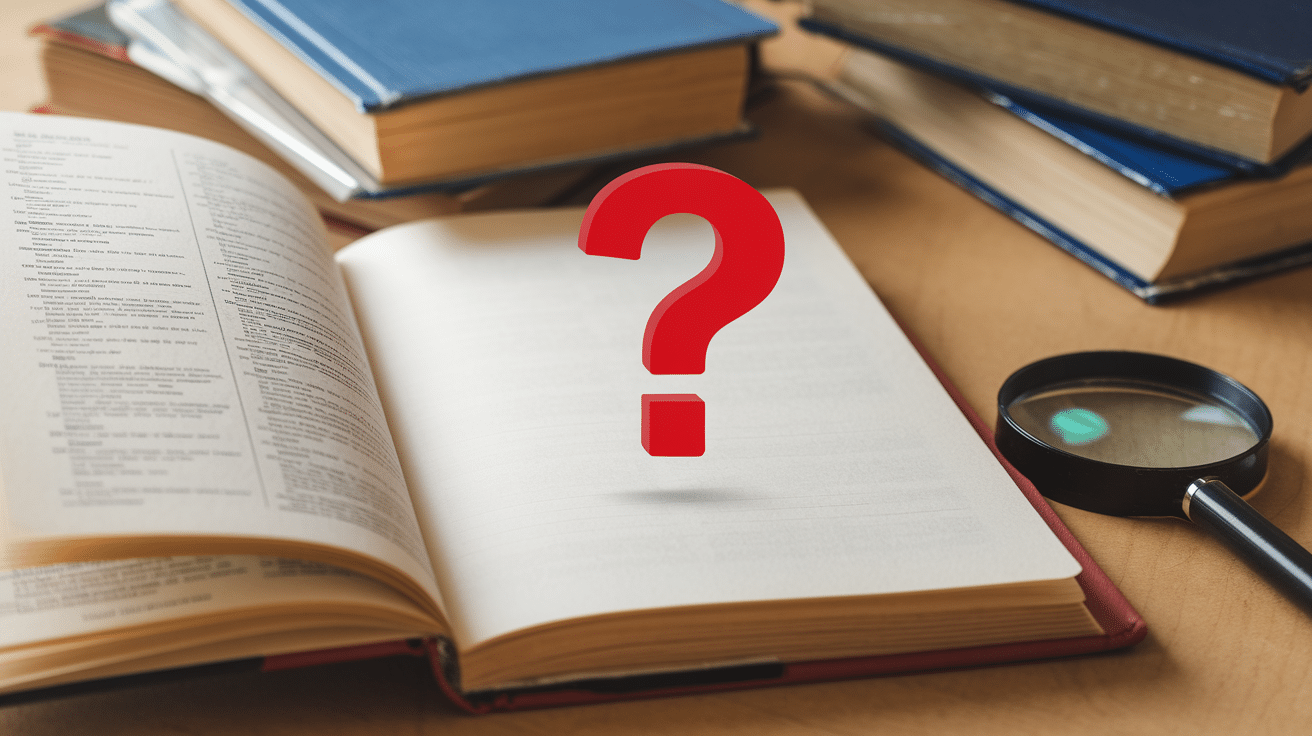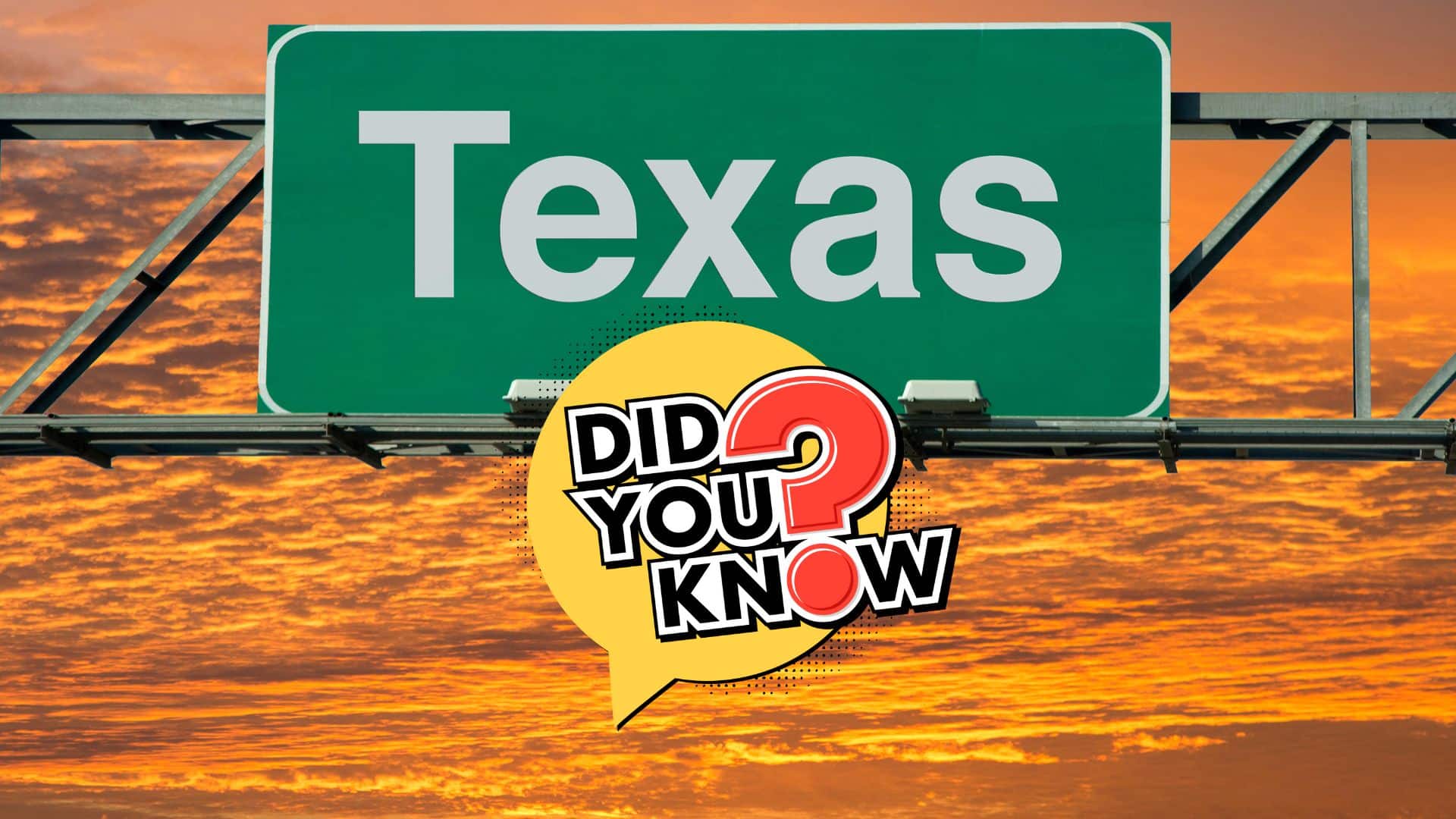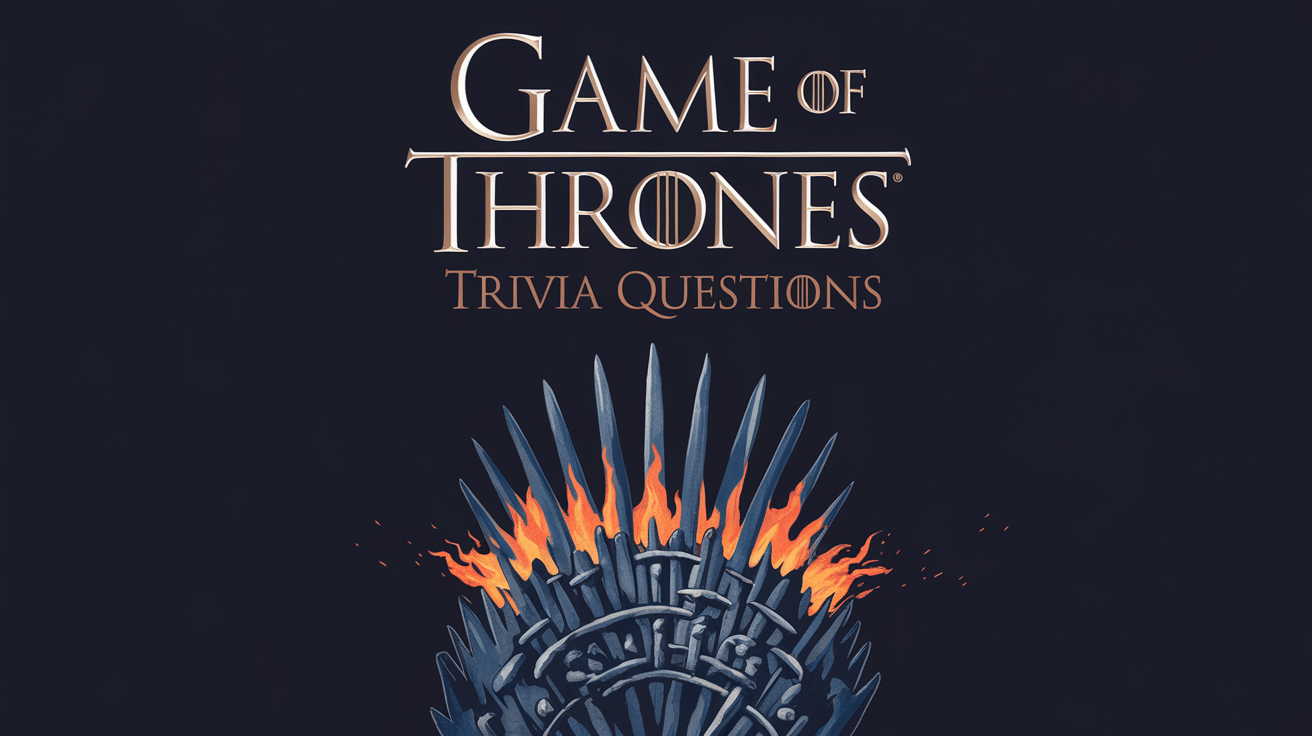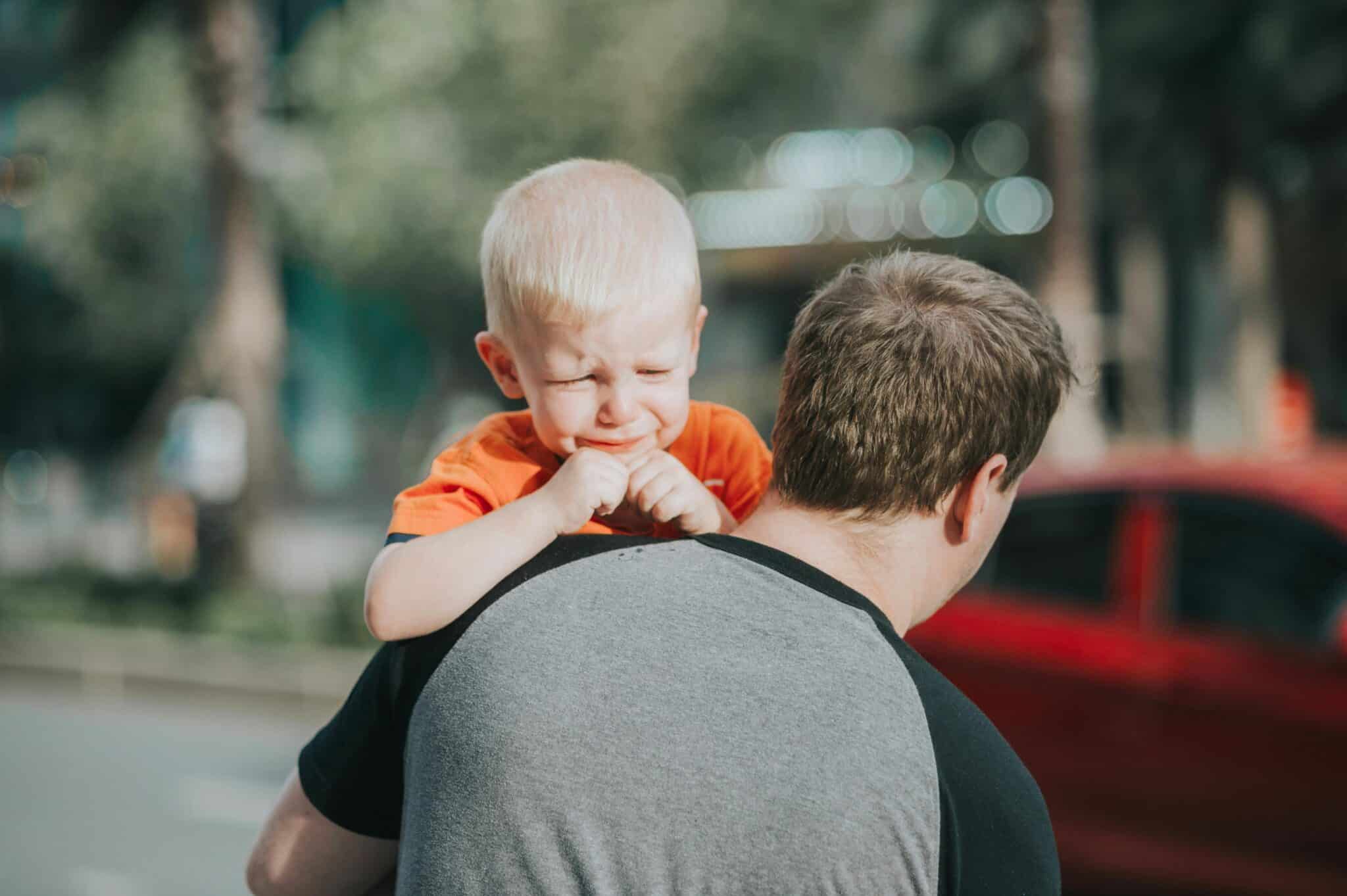
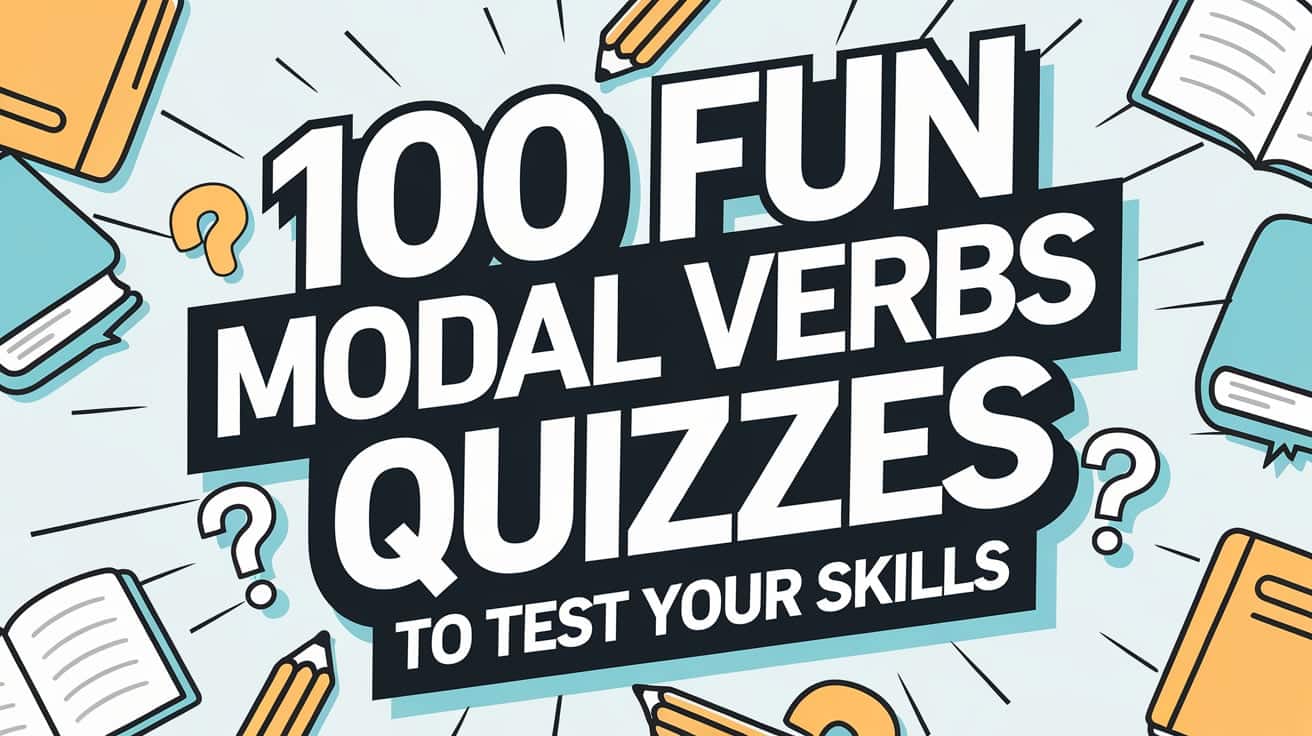
100 Fun Modal Verbs Quizzes to Test Your Skills
100 Fun Modal Verbs Quizzes to Test Your Skills
100 Fun Modal Verbs Quizzes to Test Your Skills
 James Edwards
James Edwards
January 11, 2025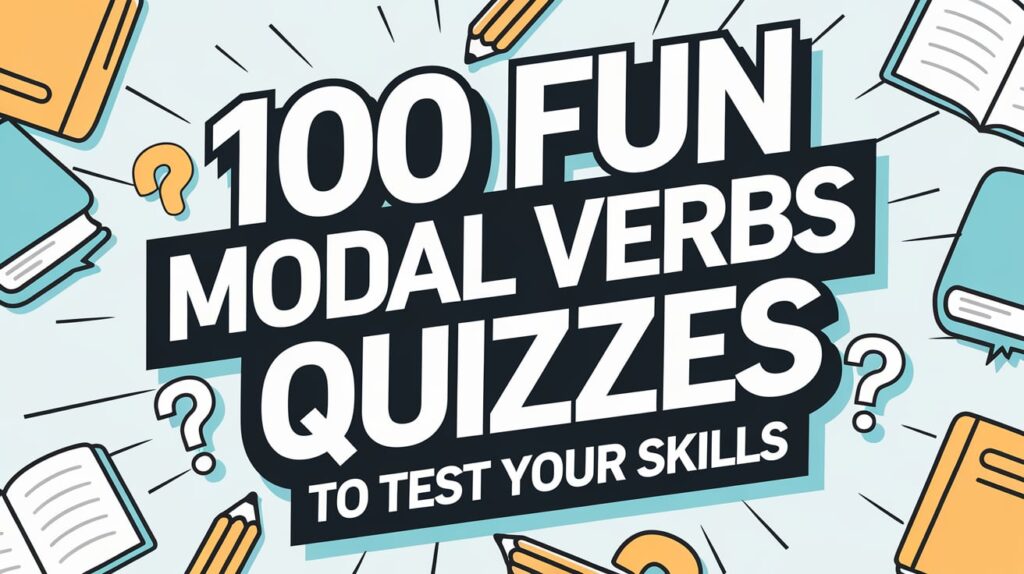
Ready for a Modal‑Verb Challenge?
Ever feel like practicing must, should, can and the rest of the modal brigade is as exciting as sorting socks? Not anymore. We’ve baked a quiz that keeps your brain awake and your grammar on point.
Why This Quiz Rocks
- 100+ real‑world scenarios – from poking at school rules to nudging folks on life hacks.
- Step‑by‑step guidance – no jargon, just friendly hints that show you why one verb fits better than another.
- Totally bite‑size – each question is a quick pick‑and‑match; you’re good to move on after a few seconds.
How It Works
- Read the situation – imagine what’d happen if a sentence had the wrong modal.
- Choose the right verb – your instinct will guide you. If you’re unsure, we’ll give you a nudge!
- Score & Learn – you’ll see instant feedback and a short explainer for every choice.
Quick Tips for Winning
- Must = “I’m required” (think exam rules).
- Should = “Advice or a gentle nudge” (like telling a friend to drink water).
- Can = “Possibility or ability” (you can jump over a puddle).
- Could = “Polite possibility” (could you help me?).
- Might = “Uncertain possibility” (I might be late).
Drop in now, test your modal know‑how, grab the bragging rights, and maybe even learn a new trick along the way. Let’s roll!
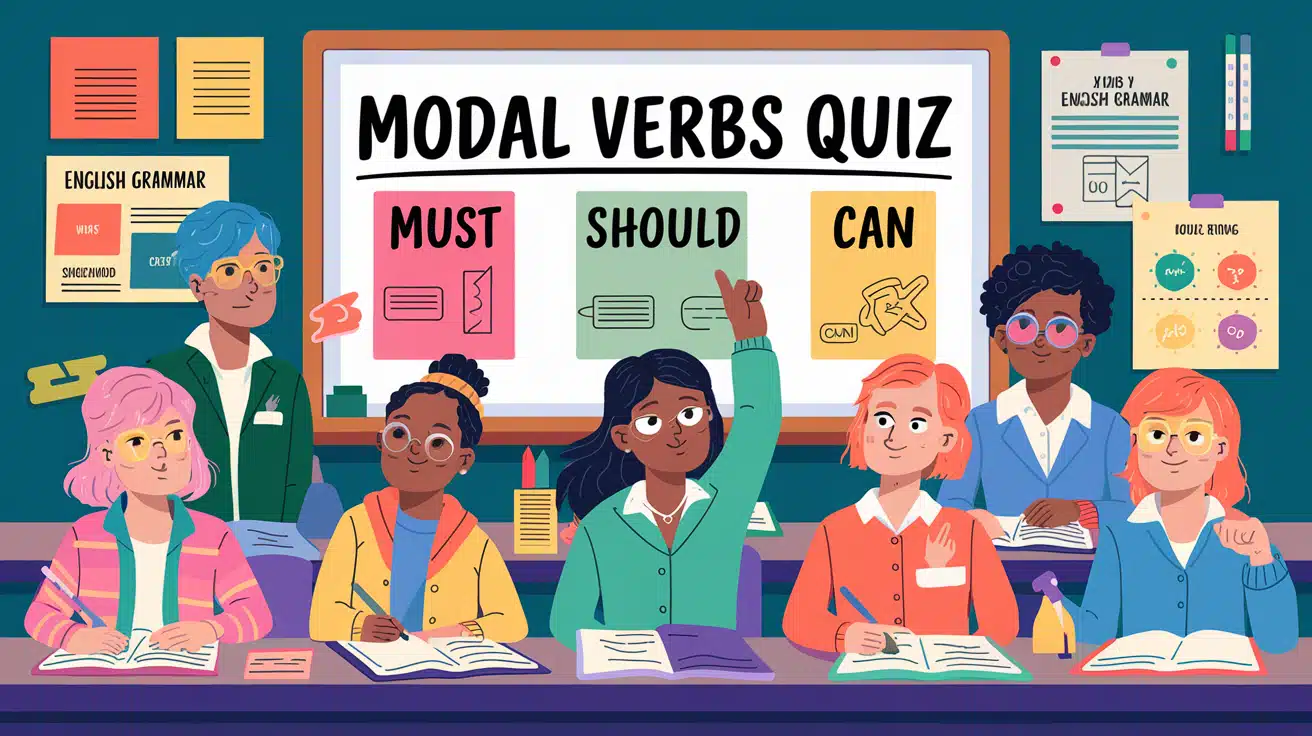
Q1. You ______ wear a helmet when riding a bike.
A. mustB. canC. willD. shouldAnswer: A. mustExplanation: “Must” is used here because wearing a helmet is a safety requirement and is often mandated by law.
Q2. I ______ speak Spanish fluently when I was younger.
A. canB. couldC. wouldD. shouldAnswer: B. couldExplanation: “Could” indicates past ability in a specific context or period.
Q3. You ______ smoke here; it’s against the rules.
A. can’tB. mustn’tC. don’t have toD. shouldn’tAnswer: C. mustn’tExplanation: “Mustn’t” is used for prohibition, indicating something that is not allowed.
Q4. We ______ leave now if we want to catch the train.
A. canB. mustC. shouldD. mightAnswer: C. shouldExplanation: “Should” suggests a recommendation or a good idea, emphasizing the need to leave soon to catch the train.
Q5. If you want to see better, you ______ wear your glasses.
A. mustB. shouldC. couldD. have toAnswer: D. have toExplanation: “Have to” expresses necessity, especially when it’s linked to a specific need or requirement.
Q6. I really ______ get up early tomorrow for my flight.
A. have toB. mustC. shouldD. couldAnswer: A. have toExplanation: “Have to” is used to express an obligation that is usually not up to the speaker, such as catching a flight.
Q7. It ______ rain tomorrow, according to the weather forecast.
A. mustB. shouldC. mightD. couldAnswer: C. mightExplanation: “Might” is used to express possibility, suitable for uncertain weather predictions.
Q8. He ______ be waiting for us when we arrive.
A. shouldB. mustC. mightD. canAnswer: C. mightExplanation: “Might” implies a possibility or uncertainty about his waiting status.
Q9. You ______ tell lies; it’s bad manners.
A. shouldn’tB. don’t have toC. can’tD. mustn’tAnswer: A. shouldn’tExplanation: “Shouldn’t” is used to advise against something that is considered wrong or inappropriate, like telling lies.
Q10. You ______ revise thoroughly if you want to pass your exams.
A. canB. mustC. shouldD. mightAnswer: B. mustExplanation: “Must” is used to stress the necessity of revising to ensure passing the exams.
Q11. I ______ come to your party, but I need to confirm my schedule.
A. mightB. mustC. canD. willAnswer: A. mightExplanation: “Might” expresses possibility, dependent on the confirmation of the speaker’s schedule.
Q12. ______ you help me move this table, please?
A. CanB. WouldC. ShouldD. CouldAnswer: D. CouldExplanation: “Could” is used here as a polite request for assistance.
Q13. You ______ touch the artifacts in the museum.
A. can’tB. mustn’tC. shouldn’tD. don’t have toAnswer: B. mustn’tExplanation: “Mustn’t” indicates strict prohibition, suitable for rules about not touching artifacts in a museum.
Q14. I’m so hungry I ______ eat a whole pizza myself.
A. couldB. shouldC. mightD. mustAnswer: A. couldExplanation: “Could” is used to express the ability or capacity to do something, especially in hypothetical scenarios.
Q15. She ______ understand the assignment; she needs more explanation.
A. mustB. canC. might notD. shouldn’tAnswer: C. might notExplanation: “Might not” indicates a possibility of not understanding, suggesting uncertainty about her comprehension.
Q16. You ______ forget to send the invitation letters.
A. don’t have toB. shouldn’tC. can’tD. mustn’tAnswer: D. mustn’tExplanation: “Mustn’t” strongly advises against forgetting to send the letters, implying that it is crucial to remember.
Q17. He ______ know the truth about the incident.
A. mightB. mustC. couldD. shouldAnswer: A. mightExplanation: “Might” suggests the possibility that he knows the truth without certainty.
Q18. We ______ take our shoes off before entering the temple.
A. shouldB. canC. mustD. have toAnswer: C. mustExplanation: “Must” is used to express a compulsory action, typical for cultural or religious practices like entering a temple.
Q19. They ______ be very pleased to hear the good news.
A. shouldB. mustC. willD. mightAnswer: D. mightExplanation: “Might” reflects the possibility of them being pleased, acknowledging that reactions can vary.
Q20. You ______ speak loudly in the library.
A. can’tB. mustn’tC. shouldn’tD. don’t have toAnswer: B. mustn’tExplanation: “Mustn’t” indicates prohibition, appropriate for environments like libraries where quiet is required.
Q21. Children ______ watch too much television.
A. shouldn’tB. can’tC. mustn’tD. don’t have toAnswer: A. shouldn’tExplanation: “Shouldn’t” advises against excessive TV watching for children, suggesting it’s not beneficial.
Q22. She ______ have left early; her bag is still here.
A. can’tB. mustn’tC. shouldn’tD. doesn’t have toAnswer: A. can’tExplanation: “Can’t” is used to indicate impossibility in this context, as her bag’s presence strongly suggests she hasn’t left.
Q23. I ______ read the contract before signing it.
A. mustB. shouldC. canD. have toAnswer: A. mustExplanation: “Must” implies an obligation to read the contract carefully before agreeing to its terms.
Q24. You ______ eat that; it’s not cooked properly.
A. shouldn’tB. mustn’tC. can’tD. don’t have toAnswer: A. shouldn’tExplanation: “Shouldn’t” suggests it is advisable not to eat improperly cooked food due to health risks.
Q25. He ______ lift heavy weights alone.
A. shouldn’tB. can’tC. mustn’tD. doesn’t have toAnswer: B. can’tExplanation: “Can’t” indicates that lifting heavy weights alone might be beyond his physical capability or safety.
Q26. We ______ book our tickets in advance.
A. mustB. shouldC. couldD. have toAnswer: B. shouldExplanation: “Should” suggests a recommendation to book tickets early, possibly to ensure availability or better prices.
Q27. She ______ be in her office at this time.
A. mustB. mightC. can’tD. shouldn’tAnswer: B. mightExplanation: “Might” indicates uncertainty about her presence in the office, suggesting it’s a possibility.
Q28. I ______ see a doctor if the pain persists.
A. mustB. shouldC. canD. have toAnswer: B. shouldExplanation: “Should” implies it is advisable to seek medical advice if the pain continues, considering health concerns.
Q29. You ______ hesitate to ask for help.
A. shouldn’tB. mustn’tC. don’t have toD. can’tAnswer: A. shouldn’tExplanation: “Shouldn’t” advises against hesitating to seek help when needed, encouraging proactive behavior.
Q30. He ______ apologize for his rude behavior.
A. mustB. shouldC. couldD. has toAnswer: B. shouldExplanation: “Should” indicates that apologizing would be the appropriate action in response to rude behavior.
Q31. We ______ worry too much about the situation.
A. shouldn’tB. mustn’tC. can’tD. don’t have toAnswer: A. shouldn’tExplanation: “Shouldn’t” is used to advise against excessive worrying, suggesting that it may not be productive or necessary.
Q32. You ______ finish your homework before you play.
A. mustB. shouldC. canD. have toAnswer: D. have toExplanation: “Have to” implies a requirement or obligation, stressing the importance of completing homework before engaging in leisure activities.
Q33. She ______ be on the next train; she said she was leaving soon.
A. mustB. mightC. shouldD. couldAnswer: B. mightExplanation: “Might” suggests possibility, reflecting uncertainty about her exact departure but indicating it’s likely.
Q34. I ______ attend the meeting if I’m still sick.
A. can’tB. shouldn’tC. mustn’tD. don’t have toAnswer: B. shouldn’tExplanation: “Shouldn’t” advises against attending if unwell, emphasizing consideration for one’s health and that of others.
Q35. You ______ park here; it’s reserved for staff.
A. can’tB. mustn’tC. shouldn’tD. don’t have toAnswer: A. can’tExplanation: “Can’t” is used for prohibitions, especially when specific rules or regulations restrict actions, such as parking in reserved spots.
Q36. They ______ bring their pets to the park.
A. canB. mustC. shouldD. have toAnswer: A. canExplanation: “Can” indicates permission, implying that bringing pets is allowed in the park.
Q37. He ______ think carefully before making a decision.
A. mustB. shouldC. couldD. has toAnswer: B. shouldExplanation: “Should” suggests a recommendation to consider all aspects carefully, which is prudent in decision-making.
Q38. You ______ lock the door when you leave.
A. mustB. shouldC. have toD. canAnswer: C. have toExplanation: “Have to” implies a requirement, stressing the necessity of security measures like locking doors.
Q39. She ______ call us as soon as she arrives.
A. mustB. shouldC. canD. willAnswer: A. mustExplanation: “Must” is used to express a strong obligation or instruction, indicating that calling upon arrival is expected or agreed upon.
Q40. I ______ swim well when I was a child.
A. couldB. shouldC. mustD. mightAnswer: A. couldExplanation: “Could” is used to describe past abilities, indicating that swimming well was within the speaker’s capabilities during childhood.
Q41. You ______ tell anyone about this conversation.
A. mustn’tB. shouldn’tC. can’tD. don’t have toAnswer: A. mustn’tExplanation: “Mustn’t” indicates a strong prohibition or restriction, emphasizing the need for confidentiality in this context.
Q42. He ______ join us later at the café.
A. canB. mustC. shouldD. mightAnswer: D. mightExplanation: “Might” suggests a possibility, indicating uncertainty but the potential for him to join later.
Q43. We ______ take care of our environment.
A. mustB. shouldC. canD. have toAnswer: A. mustExplanation: “Must” conveys a strong imperative, emphasizing an ethical or moral obligation to protect the environment.
Q44. You ______ feed the animals in the zoo.
A. can’tB. mustn’tC. shouldn’tD. don’t have toAnswer: B. mustn’tExplanation: “Mustn’t” is used to prohibit actions explicitly, which is suitable for rules like not feeding animals in a zoo to ensure their health and safety.
Q45. She ______ wait for us at the entrance.
A. mustB. shouldC. couldD. mightAnswer: B. shouldExplanation: “Should” implies a recommendation, suggesting it would be a good idea for her to wait at a designated spot to facilitate meeting up.
Q46. I ______ forget to mail these letters today.
A. mustn’tB. shouldn’tC. can’tD. don’t have toAnswer: A. mustn’tExplanation: “Mustn’t” indicates a strong prohibition against forgetting, stressing the importance of completing this task today.
Q47. You ______ drive without a valid license.
A. can’tB. mustn’tC. shouldn’tD. don’t have toAnswer: A. can’tExplanation: “Can’t” is used to state a legal impossibility, emphasizing that driving without a license is not permitted under the law.
Q48. He ______ be so careless with his words.
A. mustn’tB. shouldn’tC. can’tD. doesn’t have toAnswer: B. shouldn’tExplanation: “Shouldn’t” advises against carelessness, suggesting it is unwise or inappropriate to be reckless with language.
Q49. We ______ ignore the warnings.
A. can’tB. mustn’tC. shouldn’tD. don’t have toAnswer: B. mustn’tExplanation: “Mustn’t” conveys a strong directive not to disregard safety warnings, underscoring the importance of heeding them for safety.
Q50. You ______ cross the street when the light is red.
A. can’tB. mustn’tC. shouldn’tD. don’t have toAnswer: A. can’tExplanation: “Can’t” is used here to indicate that it is not permissible by law to cross during a red signal, reflecting a rule or regulation.
Q51. She ______ borrow my car if she needs it.
A. canB. shouldC. mustD. mightAnswer: A. canExplanation: “Can” is used to give permission, indicating that it is allowable for her to borrow the car if necessary.
Q52. I ______ finish this report by the end of the day.
A. mustB. shouldC. canD. have toAnswer: D. have toExplanation: “Have to” expresses necessity due to external obligations or requirements, emphasizing the need to complete the report within the specified timeframe.
Q53. You ______ take responsibility for your actions.
A. mustB. shouldC. canD. have toAnswer: A. mustExplanation: “Must” is used to stress the ethical or moral obligation to accept responsibility, highlighting the importance of accountability.
Q54. He ______ be joking; he can’t be serious.
A. mustB. mightC. couldD. shouldAnswer: B. mightExplanation: “Might” suggests a possibility, indicating uncertainty about whether he is serious or joking.
Q55. We ______ keep our city clean.
A. mustB. shouldC. canD. have toAnswer: A. mustExplanation: “Must” conveys a strong imperative, underscoring the collective responsibility to maintain cleanliness in the community.
Q56. You ______ play outside until it’s dark.
A. canB. mustC. shouldn’tD. don’t have toAnswer: A. canExplanation: “Can” indicates permission, allowing children to play outside until a certain time, in this case, dusk.
Q57. She ______ understand the instructions by now.
A. mustB. shouldC. couldD. mightAnswer: B. shouldExplanation: “Should” implies an expectation based on previous experience or normal conditions, suggesting that by this point, understanding is anticipated.
Q58. I ______ have mistaken you for someone else.
A. mustB. couldC. mightD. shouldAnswer: B. couldExplanation: “Could” expresses a past possibility, admitting the likelihood of having made a mistake in identifying someone.
Q59. You ______ rely on public transport in this city.
A. canB. shouldC. mustD. have toAnswer: A. canExplanation: “Can” is used to indicate capability or feasibility, suggesting that the city’s public transport system is reliable enough for dependence.
Q60. He ______ stay in bed if he feels ill.
A. mustB. shouldC. canD. has toAnswer: B. shouldExplanation: “Should” advises a course of action deemed appropriate for health reasons, recommending rest while unwell.
Q61. We ______ celebrate if we win the match.
A. canB. mustC. shouldD. willAnswer: A. canExplanation: “Can” indicates possibility, suggesting that celebrating is an option available if the outcome is favorable.
Q62. You ______ worry about things that haven’t happened.
A. shouldn’tB. mustn’tC. can’tD. don’t have toAnswer: A. shouldn’tExplanation: “Shouldn’t” advises against unnecessary worry about hypothetical situations, emphasizing a healthier mindset.
Q63. She ______ go to the dentist regularly.
A. mustB. shouldC. couldD. mightAnswer: B. shouldExplanation: “Should” suggests a recommendation for maintaining dental health, emphasizing regular check-ups as a preventive measure.
Q64. I ______ believe what happened.
A. can’tB. mustn’tC. shouldn’tD. don’t have toAnswer: A. can’tExplanation: “Can’t” expresses disbelief, indicating that the event was so surprising or unexpected that it’s hard to accept as true.
Q65. You ______ study harder to improve your grades.
A. mustB. shouldC. canD. have toAnswer: B. shouldExplanation: “Should” implies a recommendation to put in more academic effort to achieve better outcomes.
Q66. He ______ be at his desk right now.
A. mustB. shouldC. mightD. canAnswer: C. mightExplanation: “Might” indicates a possibility, suggesting uncertainty about his exact location, but considering it likely, he is at his desk.
Q67. We ______ respect each other’s opinions.
A. mustB. shouldC. canD. have toAnswer: B. shouldExplanation: “Should” conveys a recommendation for mutual respect in discussions, promoting a respectful discourse.
Q68. You ______ touch the paintings in the gallery.
A. can’tB. mustn’tC. shouldn’tD. don’t have toAnswer: A. can’tExplanation: “Can’t” is used to state a strict prohibition in order to protect the artwork from damage.
Q69. She ______ see the difference after the renovations.
Answer Breakdown
When you’re faced with the choices A. must, B. should, C. could, and D. might, the winner is C. could. That’s the option that keeps things open‑ended and perfectly fits the context.
What “Could” Really Means
- Flexibility – It suggests a possibility without committing to a guaranteed outcome.
- Hopeful Tone – It hints that something might happen once the renovations finish.
- Neutral Outlook – It doesn’t push the user to act, just leaves the door ajar.
Demo of the Concept
She’s just going to • check the hallway, • notice the fresh paint, and • maybe feel more energized once the makeover is done.
Why the others don’t fit
- Must – Sounds absolute; she has to notice something.
- Should – Implies a recommendation, but not a pure possibility.
- Might – Similar to could, but the phrasing “might notice” feels less grounded in the renovation context.
Bottom line: “Could” captures that subtle, hopeful, “maybe” feeling—exactly what the sentence intends.
Q70. I ______ choose a career that I love.
A. mustB. shouldC. canD. have toAnswer: C. canExplanation: “Can” reflects the ability to make personal choices, emphasizing freedom in career decisions based on personal passion.
Q71. You ______ enter the room without knocking.
A. can’tB. mustn’tC. shouldn’tD. don’t have toAnswer: C. shouldn’tExplanation: “Shouldn’t” advises against entering without knocking as a matter of courtesy and respect for privacy.
Q72. He ______ repair his bike before he can ride it.
A. mustB. shouldC. canD. has toAnswer: D. has toExplanation: “Has to” emphasizes a necessity for safety; the bike must be in good condition to ensure it’s safe to ride.
Q73. We ______ help each other in times of need.
A. mustB. shouldC. canD. have toAnswer: A. mustExplanation: “Must” implies a strong ethical or moral obligation to support one another during challenging times.
Q74. You ______ smoke near the gas station.
A. can’tB. mustn’tC. shouldn’tD. don’t have toAnswer: A. can’tExplanation: “Can’t” is used for prohibitions, particularly when safety regulations explicitly forbid an action like smoking near flammable materials.
Q75. She ______ take her medication every day.
A. mustB. shouldC. canD. has toAnswer: D. has toExplanation: “Has to” is used to express a requirement, often for health reasons, indicating that taking medication is necessary for her well-being.
Q76. I ______ admit, I was wrong.
A. mustB. shouldC. canD. have toAnswer: A. mustExplanation: “Must” conveys a strong personal obligation or duty to acknowledge a mistake, reflecting honesty and responsibility.
Q77. You ______ listen to your parents.
A. mustB. shouldC. canD. have toAnswer: B. shouldExplanation: “Should” suggests a recommendation based on respect and traditional values, advising adherence to parental guidance.
Q78. He ______ save some money every month.
A. mustB. shouldC. canD. has toAnswer: B. shouldExplanation: “Should” indicates a prudent financial practice, suggesting it’s wise to save money for future needs regularly.
Q79. We ______ complain about the service.
A. can’tB. mustn’tC. shouldn’tD. don’t have toAnswer: C. shouldn’tExplanation: “Shouldn’t” advises against complaining perhaps to maintain decorum or because the issue may not be significant enough to warrant a complaint.
Q80. You ______ climb that mountain without proper gear.
A. can’tB. mustn’tC. shouldn’tD. don’t have toAnswer: A. can’tExplanation: “Can’t” reflects the impossibility or extreme danger of attempting such a task without the necessary equipment, emphasizing safety concerns.
Q81. She ______ know better than to go alone at night.
A. mustB. shouldC. canD. has toAnswer: B. shouldExplanation: “Should” suggests an expectation of better judgment, implying that it would be wiser for her to avoid going alone at night for safety reasons.
Q82. I ______ find a better solution.
A. mustB. shouldC. canD. have toAnswer: C. canExplanation: “Can” indicates the ability or potential to discover a more effective solution, reflecting optimism and determination.
Q83. You ______ leave early if you’re tired.
A. canB. mustC. shouldD. have toAnswer: A. canExplanation: “Can” provides permission or an option, allowing the person to leave early based on their personal condition, such as fatigue.
Q84. He ______ check the engine before we leave.
A. mustB. shouldC. canD. has toAnswer: D. has toExplanation: “Has to” indicates a necessity, emphasizing that checking the engine is essential for ensuring the vehicle’s reliability before departure.
Q85. We ______ speak to the manager about this issue.
A. canB. mustC. shouldD. have toAnswer: C. shouldExplanation: “Should” suggests a recommendation to address a problem by consulting someone in authority, implying it’s the appropriate action.
Q86. You ______ forget your friend’s birthday.
A. can’tB. mustn’tC. shouldn’tD. don’t have toAnswer: C. shouldn’tExplanation: “Shouldn’t” advises against forgetting important personal events, implying that remembering such dates shows care and consideration.
Q87. She ______ practice more if she wants to win.
A. mustB. shouldC. canD. has toAnswer: B. shouldExplanation: “Should” implies a recommendation for achieving a goal, suggesting that increased practice is advisable to improve her chances of winning.
Q88. I ______ be mistaken, but I think I saw him leave.
A. mustB. couldC. mightD. shouldAnswer: B. couldExplanation: “Could” indicates the possibility of being wrong, allowing for uncertainty in one’s observation or memory.
Q89. You ______ make noise in the hospital.
A. can’tB. mustn’tC. shouldn’tD. don’t have toAnswer: A. can’tExplanation: “Can’t” is used to state a prohibition, particularly in settings requiring quiet, such as hospitals, to maintain a calm environment for patients.
Q90. He ______ ask for directions if he gets lost.
A. canB. mustC. shouldD. has toAnswer: C. shouldExplanation: “Should” suggests a sensible course of action, advising that asking for directions is a wise decision when one is unsure of their location.
Q91. We ______ thank our host for the dinner.
A. canB. mustC. shouldD. have toAnswer: C. shouldExplanation: “Should” implies a social expectation or norm, suggesting that expressing gratitude is the polite and appropriate response after being hosted.
Q92. You ______ worry about the small details.
A. can’tB. mustn’tC. shouldn’tD. don’t have toAnswer: C. shouldn’tExplanation: “Shouldn’t” advises against focusing too much on minor issues, implying that it might be more productive to concentrate on the bigger picture.
Q93. She ______ take care of her health.
A. mustB. shouldC. canD. has toAnswer: B. shouldExplanation: “Should” reflects a recommendation, emphasizing the importance of health maintenance as a priority.
Q94. I ______ expect you to understand.
A. can’tB. mustn’tC. shouldn’tD. don’t have toAnswer: A. can’tExplanation: “Can’t” indicates an inability or lack of expectation that the other person will comprehend, perhaps due to the complexity or personal nature of the topic.
Q95. You ______ accept the job offer if it feels right.
A. canB. mustC. shouldD. have toAnswer: A. canExplanation: “Can” provides the option or permission, suggesting that the decision to accept the offer should be based on personal judgment and feelings.
Q96. He ______ be careful with his words.
A. mustB. shouldC. canD. has toAnswer: B. shouldExplanation: “Should” implies a recommendation for prudence and thoughtfulness in communication to avoid misunderstandings or offense.
Q97. We ______ avoid taking unnecessary risks.
A. mustB. shouldC. canD. have toAnswer: A. mustExplanation: “Must” stresses the importance of caution and risk management, highlighting the need to prioritize safety.
Q98. You ______ consider all options before deciding.
A. canB. mustC. shouldD. have toAnswer: C. shouldExplanation: “Should” suggests that a thorough evaluation of alternatives is wise before making a decision, ensuring well-informed choices.
Q99. She ______ follow the diet strictly.
A. mustB. shouldC. canD. has toAnswer: D. has toExplanation: “Has to” conveys an obligation, possibly for health reasons, emphasizing the necessity of adhering strictly to a prescribed diet.
Q100. I ______ send a reminder about the meeting.
A. mustB. shouldC. canD. have toAnswer: A. mustExplanation: “Must” indicates a strong obligation or duty, particularly in a professional context, to ensure that all participants are aware and prepared for the upcoming meeting.
Conclusion
Hey, look at you – you’ve just worked through 100 modal verb questions! Pretty cool, right?
Think about where you started and where you are now. Each question wasn’t just about picking ‘must’ or ‘should’ – it was about real situations you face every day.
Making plans with friends? Now you know when to use ‘might.’ Setting rules at home? ‘Must’ is your go-to word. Giving friendly advice? ‘Should’ works perfectly.
Even if some questions were tricky, you stuck with it. That’s what counts!
Next time you talk or write in English, these modal verbs will feel more like old friends than grammar rules.
X

